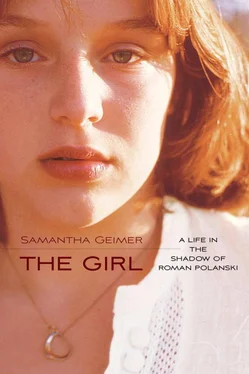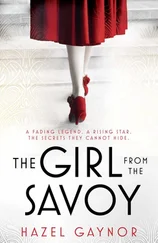He “allowed” her to do other theater after that, but that moment seemed a turning point. When I was ten, Mom moved to New York City—which, frankly, was not so different than her living at home, because she was gone so much. My parents were still married—but not for long.
In New York my mother met Bob Nesbitt, a fellow cast member in the off-Broadway play Room Service, which they were doing with Shelley Berman. Bob was tall and handsome with a great laugh—the kind of man who was easy for women to love. My mother was no exception. Soon after they met she returned to York to break the news to my dad. He was devastated—and furious. I was torn. I think a lot of kids would have hated the upheaval, hated this charming interloper, but I was never one to see things in black-and-white. I wanted my dad, but Bob was a great man. He treated me like a person, not a child. And he made my mother happy.
It was 1974. The divorce rate in the United States had doubled over ten years, and newspapers were reporting how divorcing couples were going to court for the privilege of not keeping their children. A California psychologist quoted in the New York Times declared the American family was no longer “the basic unit of our society.”
I got to be an expert in traveling on my own. During the week, while Mom was in New York auditioning, I’d be back at Edgar Fahs Smith Junior High in York. Then, every other Friday I’d take the train from Baltimore to New York City’s Grand Central Terminal and stay with her for the weekend in Brooklyn Heights, often crossing the bridge to explore Manhattan. New York City in 1974 was in the midst of the worst fiscal crisis in its history. It was teetering on the edge of bankruptcy, drug crime was rampant, and you couldn’t even drive your car in Manhattan without being accosted by the squeegee guys with their filthy rags and outstretched hands. This was before Disney annexed Forty-Second Street; back then hookers with rainbow Afros still had the run of Times Square.
Not surprisingly, my mom didn’t stay in New York long. She was getting commercial work, which paid the bills but wasn’t exactly what she’d had in mind when she moved there. She had also gotten me an agent. I became increasingly ambivalent about the whole thing, so much so that as I got a little older, I’d blow off auditions. When I bothered to show up, things often went well. I got two callbacks for the starring role of the daughter in Freaky Friday, which ultimately went to Jodie Foster. Everyone was really excited about this, with the possible exception of me.
My mother’s career still wasn’t taking off, but now she was with a man who shared her ambition: to go to Hollywood and find the lives they knew they were meant to have.
In the summer of 1975, after seventh grade, Mom and Bob packed up their Ford Fairlane with me, Kim, and our dog Rocky, and headed west to Los Angeles. They’d be staying there. But for me, this was just supposed to be a summer jaunt. I’d be going home afterward to live with my father.
It didn’t work out that way. At the end of the summer I flew home to live with Dad, which is where I wanted to be. But a few months later I was given a choice, or more precisely, told I had a choice: I could stay there or leave York and live with Mom in California if I wanted to. I did not. I was a daddy’s girl, and besides, how many kids want to leave home and head for the unknown? My father must have thought that giving me the illusion of control over the choice would make me happy. But then I learned the truth.
He took me to a local sandwich shop, where I told him my choice was to stay with him. He said, “Look, you really are only staying here because you want to be with your friends. You have to go live with your mom.” I sobbed. I could see he was glad I cried, because he didn’t want me to go, either. Maybe he would have kept me, I don’t know. But I think for all his progressiveness, he still felt a girl had to be with her mother. Besides, he had already moved on—he was dating, trying to make a new life. Living with an increasingly moody tween wasn’t part of his plan.
That January of 1976, the first time Dad drove me to the airport, I still remember how lost I felt knowing I’d never live in York again. I couldn’t stop thinking about it as I stuffed my pet rat, Odin, into my carry-on. (I was quite a good smuggler at thirteen.)
Grim as it was, York was home—and the Pacific Palisades section of Los Angeles most certainly was not. It was beautiful, sure; I lived right near the beach where, a few years later, Baywatch would be filmed. But to be living in a beach bungalow covered in vines—when I moved in, one sprung out of the closet, making me scream—was a shock after the solidity of York.
More shocking, of course, was the California culture. I arrived at just about the same time as the Eagles dropped Hotel California. (“Cool wind in my hair / warm smell of colitas rising up through the air”). I was Aerosmith and Queen; this was Joni, the Doobie Brothers, surfers and skateboarders, and a whole lot of drugs as a path to self-discovery. But with all the peace, love, and rock and roll, there was also this brooding undercurrent of violence. California, like much of the country, saw an enormous leap in violent crimes in the mid- to late 1970s. Serial killers like Herbert Mullin and Edmund Kemper, the so-called Co-ed Killer, were still fresh in everyone’s mind. They would be replaced in less than a year by the even more horrific Kenneth Bianchi and Angelo Buono, aka the Hillside Strangler. In ninth grade, we were all terrified.
Mom and Bob continued to audition for acting gigs, but by the time we moved out to the San Fernando Valley in the fall of 1976, to make ends meet Bob had taken a job selling advertising at a new magazine called Marijuana Monthly . He and Mom smoked every night in their room—secretly, they thought—for the seven years they were together, and Mom’s way of finally quitting was as quintessentially 1970s as the weed smoking itself. She was on a rafting trip in the Grand Canyon and met an English doctor who was a disciple of a swami; he came up to her and said, “You’re searching, aren’t you?” She replied, “Yes,” and he said, “I’ll give you a mantra, if you will stop smoking.” Her mantra, she tells me, was “om a ram a hum madhu ram ham”—or at least she thinks that’s what it was—and she repeated it while she paddled, all the way home, on the bus ride, on the plane—and swears it was the mantra that allowed her to quit.
Moving in with them after Christmas of 1975, I could not have felt more of an outsider, an antisocial freak in this well-to-do beach town of surfer dudes and blond bikini kittens and all their fake drama. (Pacific Palisades fight: “If you want to be friends with me, you can’t be friends with her. ” York fight: “I’m going to beat your ass.” Which is more genuine?) It was like being on a permanent pot-infused vacation.
I don’t think I can overstate the shift in attitudes toward sex in the mid- to late 1970s versus ten or even five years before. The Joy of Sex, published in 1972, held a place of honor in my mother’s bedroom. (She never knew I read it, but naturally I did, cover to cover.) Young girls are eroticized to some extent in every culture, and at this point in time in our own culture that eroticization had become almost mainstream. Brooke Shields had posed nude for pictures when she was ten, and then, at twelve, she was starring in Pretty Baby, a movie about a child prostitute that probably couldn’t be made today. Just one year before, Jodie Foster had raised eyebrows with her portrayal of a teenage prostitute in Martin Scorsese’s Taxi Driver . Manhattan was Woody Allen’s homage not just to New York City, but to a middle-aged man’s longing for a young teenager. And of course there was that famous 1974 film where a young girl has an incestuous relationship with her father. That was Chinatown, directed by Roman Polanski.
Читать дальше












